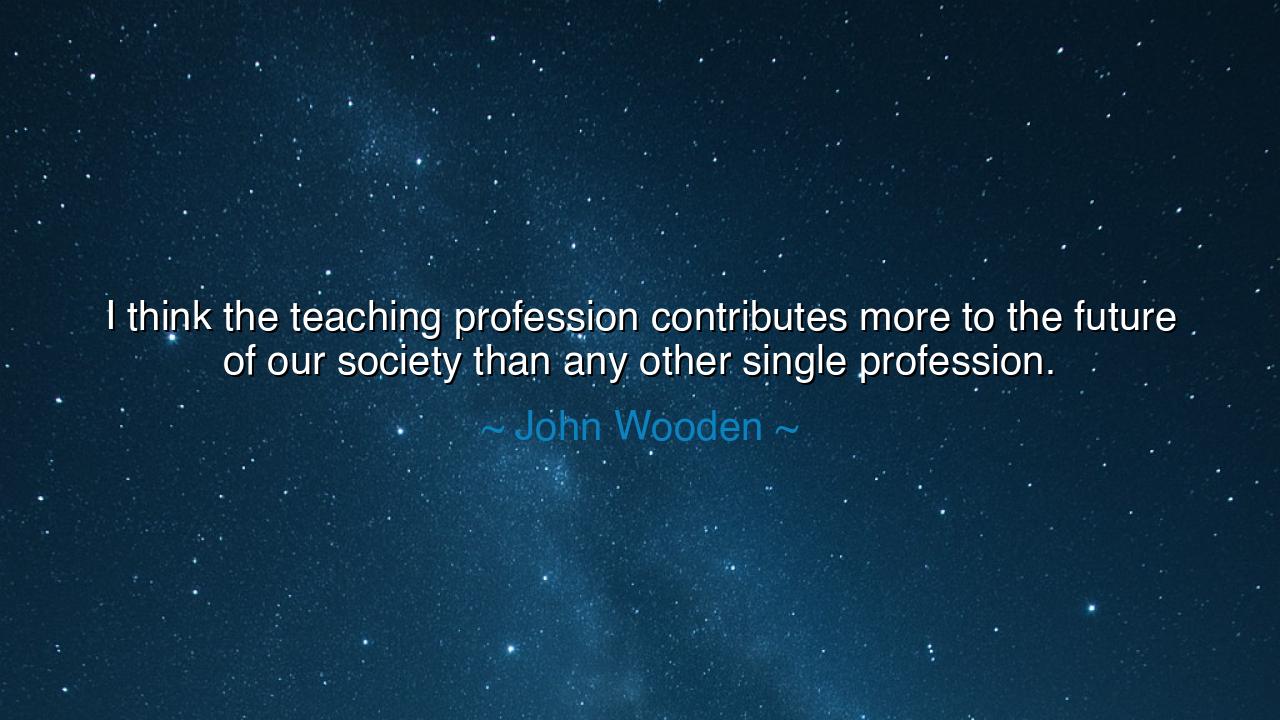
I think the teaching profession contributes more to the future of
I think the teaching profession contributes more to the future of our society than any other single profession.






"I think the teaching profession contributes more to the future of our society than any other single profession." These words by John Wooden hold a timeless truth, one that reflects the great importance of education and the teachers who shape the future. Wooden, a renowned coach and mentor, understood that while athletes may inspire with their performances and leaders may guide through their actions, it is the teacher who truly molds the minds and hearts of the next generation. The teaching profession is the bedrock upon which all future progress rests, for it is in the classrooms, the spaces of learning, that the future is forged.
In the ancient world, the role of the teacher was held in the highest esteem. The Greek philosophers, especially Socrates, Plato, and Aristotle, recognized the immense responsibility of educating the young. Socrates, through his method of questioning and dialogue, believed that education was the key to personal enlightenment and the betterment of society. He understood that by shaping the minds of the youth, a teacher had the power to shape the values, the ethics, and the very soul of the next generation. Plato, in his idealized vision of the Republic, placed great emphasis on the role of education in creating a just society, where every citizen could reach their full potential. For the ancients, the teacher was not merely a provider of knowledge but a guide to wisdom and virtue.
The Romans also understood the value of education, particularly in the development of their empire. Figures such as Cicero and Quintilian extolled the virtues of a good education, not only for the individual but for the health of the state. Cicero saw the role of the teacher as vital to the preservation of the Roman Republic, for a well-educated citizenry was essential for the functioning of the state. Quintilian, too, in his Institutio Oratoria, wrote extensively on the qualities of the ideal educator, emphasizing that education was not simply the transmission of facts, but the cultivation of character, reason, and moral judgment. These ancient teachings remind us that, from the very foundation of Western thought, the teacher has been recognized as central to the health and future of any society.
A real-world example of the power of teaching to shape society can be seen in the life of Confucius, the Chinese philosopher who, through his teachings, reshaped the moral fabric of China. Confucius did not hold a position of political power, nor did he lead armies into battle. Yet his ideas on morality, ethics, and education influenced generations of Chinese rulers, scholars, and common people. By teaching and mentoring his disciples, Confucius passed down the principles that would govern Chinese society for centuries to come. His legacy demonstrates that the impact of a teacher extends far beyond the classroom, shaping the values and actions of a nation.
The lesson John Wooden imparts is one that is universal: the teacher is the true architect of the future. More than any other profession, teaching carries with it the power to shape not just the knowledge but the very soul of society. Without teachers, the future would be blind—lacking the insight, wisdom, and moral compass that education provides. In a world that often prioritizes wealth, fame, or power, Wooden’s words remind us that the greatest legacy we can leave is the knowledge and values we pass on to others. The work of a teacher, while often unseen and underappreciated, is the most crucial work of all, for it is through education that societies evolve, grow, and flourish.
In practical terms, we must recognize and honor the role of educators in our communities. Whether we are parents, mentors, or members of society, we should continually support and uplift teachers, understanding the magnitude of their impact. We must also strive to become lifelong learners, for the journey of education never ends. Like the ancients who revered wisdom and teaching, we should seek to expand our knowledge, contribute to the education of others, and actively engage in the betterment of society through the sharing of ideas. The future belongs to those who can shape minds and nurture growth, just as Wooden’s wisdom teaches.
The legacy of teaching, like the ancient philosophers and modern mentors, is a calling that transcends time and place. As we move forward, let us continue to recognize that the true architects of a better tomorrow are those who teach, guide, and inspire. The lessons passed down today, whether through formal education or simple acts of mentorship, will shape the future in ways we cannot yet imagine. The power of the teacher is immeasurable, and it is the greatest gift we can give to the generations to come. May we all strive to honor the teacher in our lives and to contribute, in whatever way we can, to the education of the world around us.






AAdministratorAdministrator
Welcome, honored guests. Please leave a comment, we will respond soon